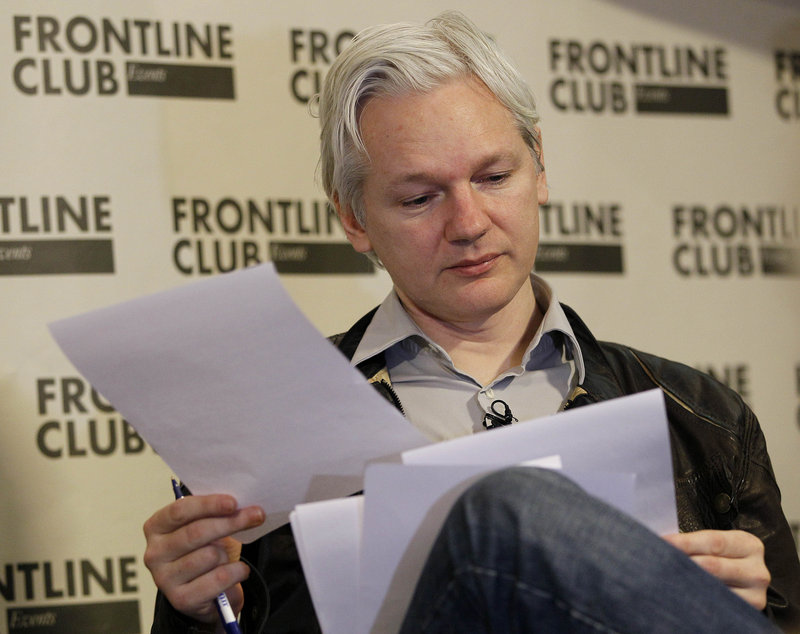SAN ANTONIO — Private intelligence firm Stratfor was paid by Coca-Cola to gauge the threat of Olympic protesters, provided Dow Chemical information on environmental activists, and sells what clients and subscribers consider some of the best geopolitical analysis that money can buy.
Now the Texas-based think tank is the latest target of WikiLeaks chief Julian Assange, who says his anti-secrecy group has more than 5 million of Stratfor’s emails and is promising to release damaging material in the coming weeks.
The first, small batch published Monday contained little that was particularly scintillating – but revealed clients that Stratfor has long safeguarded and refused to disclose. They range from local universities to megacorporations like Coca-Cola, which apparently worried about animal-rights supporters crashing and disrupting the 2010 Olympics in Vancouver, Canada.
“To what extent will US-based PETA supporters travel to Canada to support activism?” a Coca-Cola manager asked a Stratfor analyst in a 2009 email.
An initial examination of the emails turned up a mix of the innocuous and the embarrassing. But Assange has accused Stratfor of serious deeds, such as funneling money to informants through offshore tax havens, monitoring activist groups on behalf of big corporations and making investments based on its secret intelligence.
“What we have discovered is a company that is a private intelligence Enron,” Assange told London’s Frontline Club, referring to the Texas energy giant whose spectacular bankruptcy turned it into a byword for corporate malfeasance.
Stratfor denied there was anything improper in the way it dealt with its contacts.
“Stratfor has worked to build good sources in many countries around the world, as any publisher of global geopolitical analysis would do,” the company said in a statement. “We have done so in a straightforward manner and we are committed to meeting the highest standards of professional conduct.”
Headquartered on the fourth floor of a bank building in downtown Austin, Stratfor might be one of the smallest targets on which WikiLeaks has set its sights. Founded in 1996, the company was reported to have the equivalent of around 40 full-time employees in Austin in 2008 and regularly plucks interns from the nearby University of Texas campus.
According to one internal Stratfor document released by WikiLeaks, the company boasted having 292,000 paid subscribers but also acknowledged that the actual number of people reading its products is far fewer. Stratfor uses analysts to scour the Internet for open-source information, which they then use to determine where the world’s next crisis might strike.
But the company also pays for information. One email released by WikiLeaks described a $6,000-a-month payment made to a Middle Eastern source, and another carried bits of gossip dropped by a retired spy. In December, Stratfor founder George Friedman gave advice on handling sources to one of his analysts gathering information on the health of Venezuela President Hugo Chavez.
“If this is a source you suspect may have value, you have to take control (of) him. Control means financial, sexual or psychological control to the point where he would reveal his sourcing and be tasked,” the email read. “This is difficult to do when you are known to be affiliated with an intelligence organization.”
Stratfor Vice President of Intelligence Fred Burton bragged in other emails about his “trusted former CIA cronies” and promises to “see what I can uncover” about a classified FBI investigation.
Messages left for Burton weren’t immediately returned. Stratfor has speculated that some of the leaked emails may have been altered or forged, although the firm did not provide any evidence of tampering. Anonymous said in a Twitter message that the suggestion of forgery was “pathetic.”
Bobby Inman, former director of the National Security Agency and former deputy director of the Central Intelligence Agency, called Stratfor’s paid intelligence service competent and said the company has delivered “high-quality” analysis in the past. Inman said Monday that the leaked list of clients would almost “certainly be damaging” to Stratfor’s business for now.
“If you think who might find that information useful, it would be a competitor out there looking for clients,” he said.
Send questions/comments to the editors.



Success. Please wait for the page to reload. If the page does not reload within 5 seconds, please refresh the page.
Enter your email and password to access comments.
Hi, to comment on stories you must . This profile is in addition to your subscription and website login.
Already have a commenting profile? .
Invalid username/password.
Please check your email to confirm and complete your registration.
Only subscribers are eligible to post comments. Please subscribe or login first for digital access. Here’s why.
Use the form below to reset your password. When you've submitted your account email, we will send an email with a reset code.